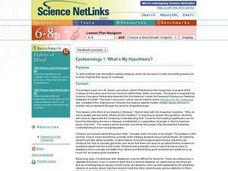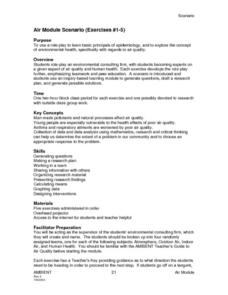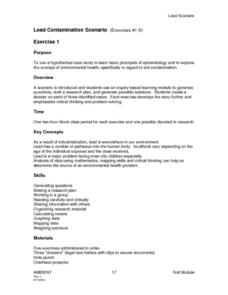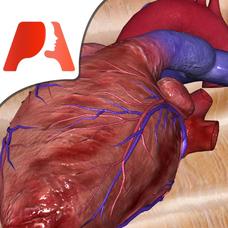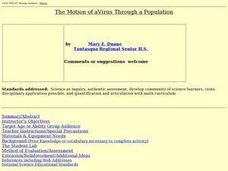Curated OER
Epidemiology 1: What's My Hypothesis?
Students demonstrate how descriptive epidemiological clues can be used to make educated guesses as to what might be the cause of a disease.
Curated OER
Air Module Scenario (Exercises #1-5)
Students, after researching/analyzing the concept of environmental health to air quality, role-play the basic principals of epidemiology. They act out a specific scenario to generate questions, draft a research plan, and generate...
Curated OER
Lead Contamination Scenario
Learners are introduced to a scenario, and students use an inquiry-based learning module to generate questions, draft a research plan, and generate possible solutions. They create a dossier on each of three identified cases.
Pocket Anatomy
Pocket Heart
An all-encompassing, fully interactive, gorgeously animated model of the heart can be used to teach cardiac anatomy, physiology, and even a touch of epidemiology.
Curated OER
Demonstrating an Epidemic
Pupils use an experiment that allows them to experience a small scale "epidemic", demonstrating the ease with which disease organisms are spread. Students determine the originator of the epidemic. They transfer live bacteria by hand...
Curated OER
How Hazardous Substances Affect People
Students examine the health effects of hazardous waste on people. They work together to complete an experiment in which worms are exposed to chemicals. They discuss the results of the test.
Curated OER
Infectious Disease Detectives
Students participate in a simulation of how diseases are transmitted. Each student holds a test tube, with only one containing the "disease" while the others have water. They move around the room until told to stop. Using droppers to...
Curated OER
Trichinella Forensics
Students engage in DNA manipulation using forensics techniques. Students investigate topics involved in forensics studies such as cloning, electrophoresis, gene mapping, replication, and transcription.
Curated OER
TE Activity: Muscles, Muscles Everywhere
Students study three different muscle types and investigate the affect of space travel on astronauts' muscles. They examine how exercise has a positive affect on muscle both on Earth and in space while looking at engineers' roles in...
Curated OER
DEMONSTRATING AN EPIDEMIC
Students experience a small scale "epidemic," demonstrating the ease with which disease organisms are spread, and enables the student to determine the originator of the "epidemic." They transfer live bacteria by hand contact, then...
Curated OER
The Motion of a Virus Through a Population
Students test the factors that influence the rate at which a virus spreads through a population. They complete a lab activity then discuss data collected and review and answer a set of questions.
Curated OER
Non-Nutrients: Fiber and Water
Students discuss how much fiber and water a person needs each day. They use beans soaked in water to show the benefits of water to the human body. They also learn the health benefits to eating healthy.
Curated OER
Cancer as a Multistep Process
Students analyze the causes of cancer from a genetic standpoint. They explain the increase in cancer with age and create a hypothesis for cancer development. They use the laws of probability as well.
Curated OER
Who Gave It to You?
Students use logic to locate the primary cases, the people who started the spread of the disease through the population. They graph the data of the number of people infected over time (exchanges) and determine an equation that best fits...
Curated OER
The Impact of War on Children
Students discover how students are affected by wars in their country. After reading a UNISEF report, they work together to summarize the article and answer comprehension questions. They examine the short- and long-term affects of...
Other popular searches
- Epidemiology Drinking Water
- Epidemiology Detectives
- History of Epidemiology
- Epidemiology Case Studies
- Diseases Epidemiology
- Virology Epidemiology
- Dr Who Epidemiology
- Epidemiology Food
- Epidemiology Lesson Plans
